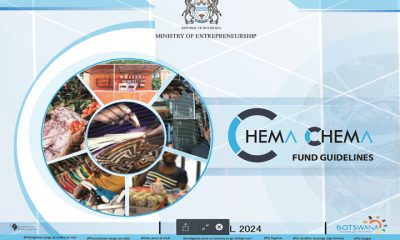DIS probes Magosi corruption docket leak

The Directorate of Intelligence Service (DIS) has reportedly launched a serious man-hunt for an officer/s who leaked the explosive prosecution docket REF: 2019/0 implicating their boss, Brigadier Peter Fana Magosi which was shelved a few steps away from prosecution in June this year.
[ihc-hide-content ihc_mb_type=”show” ihc_mb_who=”1,2,3″ ihc_mb_template=”1″ ]
The docket, believed to have sacrificed the Directorate on Corruption and Economic Crimes (DCEC) director, Tymon Katlholo was recently leaked to the public following months and efforts of keeping it away from the public eyes.
It is understood that the DIS officers have been tasked to establish: whether the docket was leaked by insiders or outsiders, when, how and for what ends. “Although the first suspects are always going to be the suspended DCEC officers the DIS is alive to the fact that they still have enemies within and does not want to leave any stone unturned. The leakage of the file has discredited the DIS boss and laid bare what he has fought tooth and nail to conceal from the public,†revealed a highly placed source at the DIS.
Meanwhile the docket remains a stillborn, and humiliated state institutions are watching from the sidelines as the members of the public continue to treat themselves on the delicate insides of the thrill-a minute-docket prepared by DCEC officers –Andria German, Tsholofelo Bareetsi, and Sethunya Motswetla.
The troubles of the DCEC and the recent failed mass transfer of DCEC staff are attributed to the hot potato docket which insiders say has since left all top DCEC staff members on indefinite suspension but on full pay.
The docket contents….
It records sordid details of corruption by the DIS boss and how his illimitable power and influence has cost the public purse countless millions of Pula. The docket further lays bare Magosi’s power within the civil service and his wanton disregard for procedure and arbitrary decisions indicating that he always pushes the limits to get what he wants no matter the process or the law.
According to the docket, which is centred around Magosi’s controversial decision to declare a Chinese Construction Outfit, China Jiangsu a national security threat, many stakeholders initially objected advising that procedure be followed but Magosi pushed his way.
The docket further states that Magosi tried to persuade the Chinese national, head of China Jiangsu, Cui Wanglin to ‘frame the alleged top civil servant’ and when he allegedly refused, war began. It was reportedly during these engagements that the accused indicated that Cui Wanglin had allegedly given certain government officials bribes and he should confirm that. When Cui Wanglin allegedly refused, as this was blatantly false, Magosi allegedly then motivated for his (Wanglin) removal from the position of managing director of CJI. It was then that allegedly an agreement was brokered where owing to his removal and appointment of a different person to that position, then Magosi would reconsider his stance on the company. Because they did not want to ‘fight’ with government, the Chinese company allegedly bowed to Magosi’s demands and replaced its MD.
Magosi then allegedly revoked the threat to national security from the company and they were cleared. For this, the DCEC posits that Magosi made ‘false’ representations to the ministry and by extension PPADB saying the only plausible explanation is the perpetuation of the abuse of his office and position.
The docket further wondered why Magosi withheld vital information relating to China Jiangsu‘s alleged threat to national security from other law enforcement agencies further reaching a conclusion that he wanted to abuse his power and achieve his ends.
The investigations…
The DCEC according to the docket received an anonymous report alleging that Magosi had abused his office or authority by directing that China Jiangsu International (CJI), a company that had won government tenders, be terminated on account of an alleged national security threat. “Another report was received whereby the DIS had wanted the DCEC and Financial Intelligence Authority (FIA) to facilitate the suspension of a payment of P112 million which was an out-of-court settlement for the termination of the Mmamashia Water Treatment Plan expansion. The tender had been awarded to China Jiangsu International and Unik Construction Engineering joint venture,†reads the docket on Magosi.
Meanwhile the DIS Director General, Magosi has denied the charges and is on record saying he will defend his actions if given a chance in court. He has made it clear that this could be a smear campaign by those who are unhappy with his drills against corruption in the country. “Nothing will stop me from fighting corruption,†he told one of the publications.
[/ihc-hide-content]
News
Nigerians, Zimbabweans apply for Chema Chema Fund

Fronting activities, where locals are used as a front for foreign-owned businesses, have been a long-standing issue in Botswana. These activities not only undermine the government’s efforts to promote local businesses but also deprive Batswana of opportunities for economic empowerment, officials say. The Ministry of Trade and Industry has warned of heavy penalties for those involved in fronting activities especially in relation to the latest popular government initiative dubbed Chema Chema.
According to the Ministry, the Industrial Development Act of 2019 clearly outlines the consequences of engaging in fronting activities. The fines of up to P50,000 for first-time offenders and P20,000 plus a two-year jail term for repeat offenders send a strong message that the government is serious about cracking down on this illegal practice. These penalties are meant to deter individuals from participating in fronting activities and to protect the integrity of local industries.
“It is disheartening to hear reports of collaboration between foreigners and locals to exploit government initiatives such as the Chema Chema Fund. This fund, administered by CEDA and LEA, is meant to support informal traders and low-income earners in Botswana. However, when fronting activities come into play, the intended beneficiaries are sidelined, and the funds are misused for personal gain.” It has been discovered that foreign nationals predominantly of Zimbabwean and Nigerian origin use unsuspecting Batswana to attempt to access the Chema Chema Fund. It is understood that they approach these Batswana under the guise of drafting business plans for them or simply coming up with ‘bankable business ideas that qualify for Chema Chema.’
Observers say the Chema Chema Fund has the potential to uplift the lives of many Batswana who are struggling to make ends meet. They argue that it is crucial that these funds are used for their intended purpose and not siphoned off through illegal activities such as fronting. The Ministry says the warning it issued serves as a reminder to all stakeholders involved in the administration of these funds to ensure transparency and accountability in their disbursement.
One local commentator said it is important to highlight the impact of fronting activities on the local economy and the livelihoods of Batswana. He said by using locals as a front for foreign-owned businesses, opportunities for local entrepreneurs are stifled, and the economic empowerment of Batswana is hindered. The Ministry’s warning of heavy penalties is a call to action for all stakeholders to work together to eliminate fronting activities and promote a level playing field for local businesses.
Meanwhile, the Ministry of Trade and Industry’s warning of heavy penalties for fronting activities is a necessary step to protect the integrity of local industries and promote economic empowerment for Batswana. “It is imperative that all stakeholders comply with regulations and work towards a transparent and accountable business environment. By upholding the law and cracking down on illegal activities, we can ensure a fair and prosperous future for all Batswana.”
News
Merck Foundation and African First Ladies mark World Health Day 2024

Merck Foundation, the philanthropic arm of Merck KGaA Germany marks “World Health Day” 2024 together with Africa’s First Ladies who are also Ambassadors of MerckFoundation “More Than a Mother” Campaign through their Scholarship and Capacity Building Program. Senator, Dr. Rasha Kelej, CEO of Merck Foundation emphasized, “At Merck Foundation, we mark World Health Day every single day of the year over the past 12 years, by building healthcare capacity and transforming patient care across Africa, Asia and beyond.
I am proud to share that Merck Foundation has provided over 1740 scholarships to aspiring young doctors from 52 countries, in 44 critical and underserved medical specialties such as Oncology, Diabetes, Preventative Cardiovascular Medicine, Endocrinology, Sexual and Reproductive Medicine, Acute Medicine, Respiratory Medicine, Embryology & Fertility specialty, Gastroenterology, Dermatology, Psychiatry, Emergency and Resuscitation Medicine, Critical Care, Pediatric Emergency Medicine, Neonatal Medicine, Advanced Surgical Practice, Pain Management, General Surgery, Clinical Microbiology and infectious diseases, Internal Medicine, Trauma & Orthopedics, Neurosurgery, Neurology, Cardiology, Stroke Medicine, Care of the Older Person, Family Medicine, Pediatrics and Child Health, Obesity & Weight Management, Women’s Health, Biotechnology in ART and many more”.
As per the available data, Africa has only 34.6% of the required doctors, nurses, and midwives. It is projected that by 2030, Africa would need additional 6.1 million doctors, nurses, and midwives*. “For Example, before the start of the Merck Foundation programs in 2012; there was not a single Oncologist, Fertility or Reproductive care specialists, Diabetologist, Respiratory or ICU specialist in many countries such as The Gambia, Liberia, Sierra Leone, Central African Republic, Guinea, Burundi, Niger, Chad, Ethiopia, Namibia among others. We are certainly creating historic legacy in Africa, and also beyond. Together with our partners like Africa’s First Ladies, Ministries of Health, Gender, Education and Communication, we are impacting the lives of people in the most disadvantaged communities in Africa and beyond.”, added Senator Dr. Kelej. Merck Foundation works closely with their Ambassadors, the African First Ladies and local partners such as; Ministries of Health, Education, Information & Communication, Gender, Academia, Research Institutions, Media and Art in building healthcare capacity and addressing health, social & economic challenges in developing countries and under-served communities. “I strongly believe that training healthcare providers and building professional healthcare capacity is the right strategy to improve access to equitable and quality at health care in Africa.
Therefore, I am happy to announce the Call for Applications for 2024 Scholarships for young doctors with special focus on female doctors for our online one-year diploma and two year master degree in 44 critical and underserved medical specialties, which includes both Online Diploma programs and On-Site Fellowship and clinical training programs. The applications are invited through the Office of our Ambassadors and long-term partners, The First Ladies of Africa and Ministry of Health of each country.” shared Dr . Kelej. “Our aim is to improve the overall health and wellbeing of people by building healthcare capacity across Africa, Asia and other developing countries. We are strongly committed to transforming patientcare landscape through our scholarships program”, concluded Senator Kelej.
News
Interpol fugitive escapes from Botswana

John Isaak Ndovi, a Tanzanian national embroiled in controversy and pursued under a red notice by the International Criminal Police Organization (Interpol), has mysteriously vanished, bypassing a scheduled bail hearing at the Extension 2 Magistrate Court in Gaborone. Previously apprehended by Botswana law enforcement at the Tlokweng border post several months earlier, his escape has ignited serious concerns.
Accused of pilfering assets worth in excess of P1 million, an amount translating to roughly 30,000 Omani Riyals, Ndovi has become a figure of paramount interest, especially to the authorities in the Sultanate of Oman, nestled in the far reaches of Asia.
The unsettling news of his disappearance surfaced following his failure to present himself at the Extension 2 Magistrate Court the preceding week. Speculation abounds that Ndovi may have sought refuge in South Africa in a bid to elude capture, prompting a widespread mobilization of law enforcement agencies to ascertain his current location.
In an official communiqué, Detective Senior Assistant Police Commissioner Selebatso Mokgosi of Interpol Gaborone disclosed Ndovi’s apprehension last September at the Tlokweng border, a capture made possible through the vigilant issuance of the Interpol red notice.
At 36, Ndovi is implicated in a case of alleged home invasion in Oman. Despite the non-existence of an extradition treaty between Botswana and Oman, Nomsa Moatswi, the Director of the Directorate of Public Prosecution (DPP), emphasized that the lack of formal extradition agreements does not hinder her office’s ability to entertain extradition requests. She highlighted the adoption of international cooperation norms, advocating for collaboration through the lenses of international comity and reciprocity.
Moatswi disclosed the intensified effort by law enforcement to locate Ndovi following his no-show in court, and pointed to Botswana’s track record of extraditing two international fugitives from France and Zimbabwe in the previous year as evidence of the country’s relentless pursuit of legal integrity.
When probed about the potential implications of Ndovi’s case on Botswana’s forthcoming evaluation by the Financial Action Task Force (FATF), Moatswi reserved her speculations. She acknowledged the criticality of steering clear of blacklisting, suggesting that this singular case is unlikely to feature prominently in the FATF’s assessment criteria.













